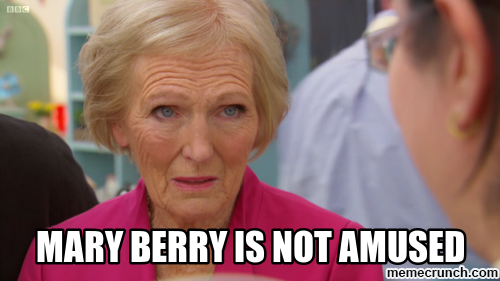I’ve recently started watching The Great British Baking Show*. I’m a bit late to the game, because, despite calling myself a foodie, I am not a fan of cooking shows. The American ones, at least, are so cutthroat, competitive, and nasty that I find them stressful. The trash-talking, sabotage, and antagonism are not fun for me, especially when I’m looking for a way to wind down after a long day in the lab.
Friends in the know assured me that the Great British Baking Show was different, however, and I’m glad I listened. It is, in a word, delightful. Yes, it’s an elimination competition, and yes, the challenges are tough and there are nail-biting moments and heartbreak, but it’s a really joyful show. There is so much to recommend it, from the diverse personalities of the bakers (from teenagers to immigrants to grandmothers to carpenters) to just how informative it is, relative to most American cooking shows.

A grant proposal is like a cupcake. Someone worked hard on it. The better feedback you give, the more yummy cupcakes you’ll get in the future. Image: Wikimedia Commons.
But what I love most of all is how respectful everyone is– especially the judges. The two expert bakers know their stuff, and their critiques are professional, honest, and fair. They always find something to praise, and strive to suggest constructive ways to improve. When something is awful, they are honest about it, but they are never mean. When bakers get eliminated, the judges always say nice things about them, and express a genuine regret that it didn’t work out.
Which brings me to the real point of this post: constructive feedback!
I had just completed an editorial decision on a paper for Ecography before watching the Bread episode, and something clicked. The Great British Bake-Off is the perfect model for how to write good journal article and proposal reviews. If you want to know how to give strong, useful, respectful feedback, Mary Berry and Paul Hollywood should be your guides.
Unfortunately, in my experience, paper and proposal (especially proposal) reviewers are more often like American reality show judges than Berry and Hollywood. I have seen (and received) mean-spirited, unhelpful proposal reviews, and paper reviews that are more used as a soapbox than the opportunity to improve a manuscript. I’m not just talking about politeness, here (though I’d prefer we frame this as one of respect for other colleagues, rather than some arbitrary social standard). To me, the more important point is one of usefulness. Who does it serve if your critiques are so terse, rude, unhelpful, or generic that they can’t (or won’t) be applied? Why are we so much quicker to point out flaws, and so slow to mention merits?
I recently had an NSF proposal reviewer say outright that I was only on a proposal to check the gender diversity box, and that I am a “competent palynologist” and don’t need “pity support” from male colleagues. The reviewer then went on a long rant about how happy they were that paleoecology was finally starting to come around to their way of thinking, and that we’d all been focusing on climate reconstructions at the expense of understanding ecological processes. First, the implication that I wasn’t deeply involved in the conception and writing of the proposal was insulting to me and my colleagues, and there was zero evidence of that in the proposal. Secondly, I’m not a “competent palynologist” (that’s like being called an acceptable lab technician), I am a highly qualified paleoecologist. Third, the reviewer’s opinions about the failings of paleoecology had no place in a proposal review, unless you can frame them in terms of excitement for a proposal (they’re also about twenty years out of date, but that’s another story).
Basically, this review served zero purpose except to make me feel badly about myself, wonder if the panel had rejected us because they thought I was just an add-on, and question whether I’ll ever get funded. There was, literally, nothing of substance to it: no substantial criticism that I can leverage for next time. No helpful way forward. The review was, in a word, a performance, and the intended audience was the reviewer’s ego. An NSF proposal review is an awful lot of work for just one person’s benefit.
This was a Cutthroat Kitchen review. It wasn’t designed to make our proposal better, or to make me a better scientist. It was entirely for the reviewer’s benefit. And what’s the point of that?
The next time you sit down to review, remember the Great British Baking Show. Be respectful. Be constructive. Don’t forget to praise. Be honest, and be critical, but be motivated from a place of encouragement. We all benefit from more and better cakes in the world; the same is true for science.
*Known as The Great British Bake-Off back in the UK. I have no idea why they changed it for the American broadcast! I watch it on Netflix.
Categories: Academia Commentary Communication Tips & Tricks

Couldn’t agree more! I spent years working with high school kids in improv, and think we could all bring a bit more of the “constructive” back into “constructive criticism” https://labandfield.wordpress.com/2014/02/08/academia-needs-more-of-the-theatrical-spirit/
LikeLike
“Basically, this review served zero purpose except to make me feel badly about myself.”
Better plan: feel badly about your reviewer. If indeed he or she even merits that term, since what you received was not in any meaningful sense a review.
You’ve been very badly treated here — first by the so-called reviewer, of course, but also by the editor who chose to pass on these idiotic sexist comments. The very last person you should feel badly about is yourself.
Hope the next one works out better, and that at the very least you get some helpful critique instead of a vainglorious soliloquy.
LikeLike
I totally agree. I have had such contrasting reviews of my work and the impact on me and my outlook is quite amazing. For example, my PhD viva experience was really good – yes, the examiners found things about my thesis that they disagreed with and wanted to talk about more, but the way that they did it, with respect and thoughtful comments rather than outright criticism, meant that the viva was a posititve experience and my thesis improved massively because of it. Compare that to the first set of reviews I got for a paper a few years ago, where one or two of the reviewers had no helpful comments at all. All that served was to make the team angry and despondent, and in no mood to go away and improve the piece of research. And isn’t improving the research what reviews are all about?
LikeLike
Reblogged this on Demoliendo hoteles and commented:
Aplicable a las revisiones y evaluaciones en general: la importancia de que sean constructivas y tengan “valor” para quien las recibe.
LikeLike
Reblogged this on Green Tea and Velociraptors and commented:
Cake and peer review? Yes please!
LikeLike
Well, I often show up with a soggy tart.
: )
Indeed, those judges are tough — but fair minded.
Not like on some cooking shows where the host is as mean as an undergraduate student evaluation …
: )
LikeLike
Really well put, Jaquelyn, and I flat out can’t believe the sour ego-boosting and uncalled for comments you received on your NSFW grant! Jeez. I think we could all do with a little constructiveness and a little respectful empathy in our fields.
LikeLike